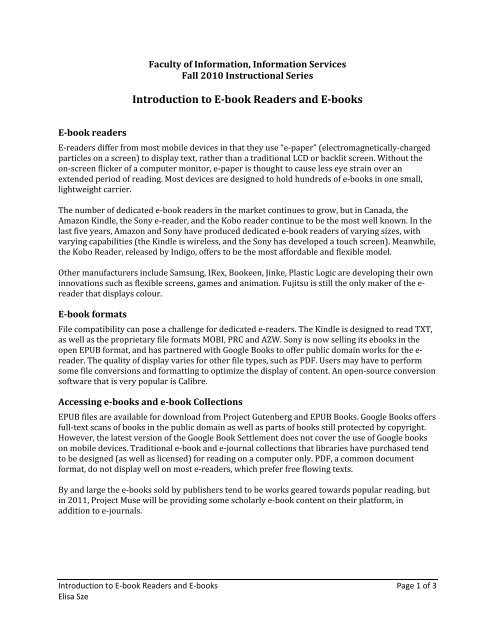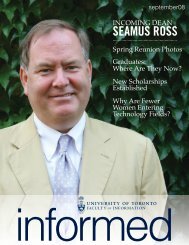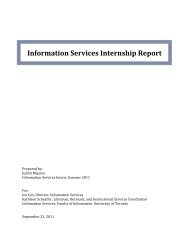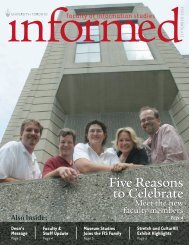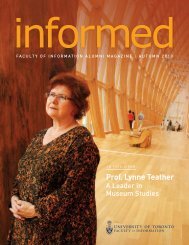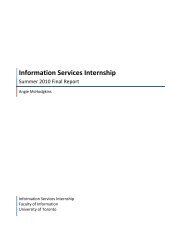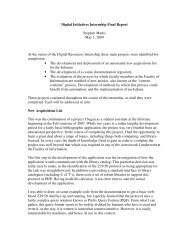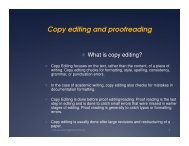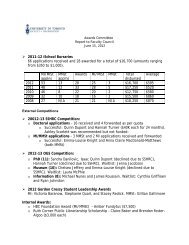Introduction to Ebook Readers and Ebooks - Faculty of Information
Introduction to Ebook Readers and Ebooks - Faculty of Information
Introduction to Ebook Readers and Ebooks - Faculty of Information
You also want an ePaper? Increase the reach of your titles
YUMPU automatically turns print PDFs into web optimized ePapers that Google loves.
<br />
<br />
Ebook readers <br />
<strong>Faculty</strong> <strong>of</strong> <strong>Information</strong>, <strong>Information</strong> Services <br />
Fall 2010 Instructional Series <br />
<strong>Introduction</strong> <strong>to</strong> Ebook <strong>Readers</strong> <strong>and</strong> Ebooks <br />
E‐readers differ from most mobile devices in that they use “e‐paper” (electromagnetically‐charged <br />
particles on a screen) <strong>to</strong> display text, rather than a traditional LCD or backlit screen. Without the <br />
on‐screen flicker <strong>of</strong> a computer moni<strong>to</strong>r, e‐paper is thought <strong>to</strong> cause less eye strain over an <br />
extended period <strong>of</strong> reading. Most devices are designed <strong>to</strong> hold hundreds <strong>of</strong> e‐books in one small, <br />
lightweight carrier. <br />
<br />
The number <strong>of</strong> dedicated e‐book readers in the market continues <strong>to</strong> grow, but in Canada, the <br />
Amazon Kindle, the Sony e‐reader, <strong>and</strong> the Kobo reader continue <strong>to</strong> be the most well known. In the <br />
last five years, Amazon <strong>and</strong> Sony have produced dedicated e‐book readers <strong>of</strong> varying sizes, with <br />
varying capabilities (the Kindle is wireless, <strong>and</strong> the Sony has developed a <strong>to</strong>uch screen). Meanwhile, <br />
the Kobo Reader, released by Indigo, <strong>of</strong>fers <strong>to</strong> be the most affordable <strong>and</strong> flexible model. <br />
<br />
Other manufacturers include Samsung, IRex, Bookeen, Jinke, Plastic Logic are developing their own <br />
innovations such as flexible screens, games <strong>and</strong> animation. Fujitsu is still the only maker <strong>of</strong> the e‐<br />
reader that displays colour. <br />
Ebook formats <br />
File compatibility can pose a challenge for dedicated e‐readers. The Kindle is designed <strong>to</strong> read TXT, <br />
as well as the proprietary file formats MOBI, PRC <strong>and</strong> AZW. Sony is now selling its ebooks in the <br />
open EPUB format, <strong>and</strong> has partnered with Google Books <strong>to</strong> <strong>of</strong>fer public domain works for the e‐<br />
reader. The quality <strong>of</strong> display varies for other file types, such as PDF. Users may have <strong>to</strong> perform <br />
some file conversions <strong>and</strong> formatting <strong>to</strong> optimize the display <strong>of</strong> content. An open‐source conversion <br />
s<strong>of</strong>tware that is very popular is Calibre. <br />
Accessing ebooks <strong>and</strong> ebook Collections <br />
EPUB files are available for download from Project Gutenberg <strong>and</strong> EPUB Books. Google Books <strong>of</strong>fers <br />
full‐text scans <strong>of</strong> books in the public domain as well as parts <strong>of</strong> books still protected by copyright. <br />
However, the latest version <strong>of</strong> the Google Book Settlement does not cover the use <strong>of</strong> Google books <br />
on mobile devices. Traditional e‐book <strong>and</strong> e‐journal collections that libraries have purchased tend <br />
<strong>to</strong> be designed (as well as licensed) for reading on a computer only. PDF, a common document <br />
format, do not display well on most e‐readers, which prefer free flowing texts. <br />
<br />
By <strong>and</strong> large the e‐books sold by publishers tend <strong>to</strong> be works geared <strong>to</strong>wards popular reading, but <br />
in 2011, Project Muse will be providing some scholarly e‐book content on their platform, in <br />
addition <strong>to</strong> e‐journals. <br />
<br />
<br />
<strong>Introduction</strong> <strong>to</strong> E‐book <strong>Readers</strong> <strong>and</strong> E‐books Page 1 <strong>of</strong> 3 <br />
Elisa Sze
<br />
<strong>Introduction</strong> <strong>to</strong> E‐book <strong>Readers</strong> <strong>and</strong> E‐books Page 2 <strong>of</strong> 3 <br />
Elisa Sze <br />
Issues for information centres <strong>to</strong> consider <br />
Copyright vs. licensing. Although copyright legislation protects how the content <strong>of</strong> books is <br />
distributed <strong>and</strong> also grants users certain rights, terms <strong>of</strong> use for e‐books are increasingly dealt with <br />
through license agreements between the consumer <strong>and</strong> the vendor/publisher. <br />
<br />
Digital Rights Management (DRM). Although e‐formats open up the possibility <strong>of</strong> multiple <br />
simultaneous users for one e‐book, libraries may employ DRM <strong>to</strong> limit access as a result <strong>of</strong> <br />
negotiating a more affordable price from the e‐book vendor. Overdrive is an example <strong>of</strong> a 3 rd party <br />
e‐book vendor that negotiates titles from publishers <strong>and</strong> provides participating libraries with <br />
access <strong>to</strong> the content, while using DRM <strong>to</strong> restrict the number <strong>of</strong> concurrent users. <br />
<br />
Privacy <strong>and</strong> intellectual freedom. Wireless e‐readers simplify the process <strong>of</strong> downloading books <br />
<strong>to</strong> the device; however, it is uncertain what guarantees the vendor can provide in terms <strong>of</strong> <br />
protecting the privacy <strong>of</strong> the e‐reader user <strong>and</strong> refraining from tracking the material loaded on<strong>to</strong> <br />
individual e‐readers. (Useful case <strong>to</strong> consider: Amazon’s deletion <strong>of</strong> Orwell’s 1984 from private <br />
Kindles in Summer 2009.) <br />
Further Reading <br />
<br />
Armstrong, C. (2008). Books in a virtual world: The evolution <strong>of</strong> the e‐book <strong>and</strong> its lexicon. Journal <br />
<strong>of</strong> Librarianship <strong>and</strong> <strong>Information</strong> Science, 40 (3), 193‐206. <br />
<br />
Baker, N. (2009). A new page: Can the Kindle really improve on the book? New York Times, August <br />
3, 2009. Retrieved from <br />
http://www.newyorker.com/reporting/2009/08/03/090803fa_fact_baker?currentPage=1 <br />
<br />
Blummer, B. (2006). E‐books revisited. Internet Reference Services Quarterly, 11(2), 1‐13. <br />
<br />
Carnoy, D. (2009). Fujitsu e‐book reader makes Kindle look cheap. CNET News, March 18, 2009. <br />
Retrieved from http://news.cneet.com/8301‐17938_105‐10198920‐1.html. <br />
<br />
Carnoy, D. (2009). IRex unveils new wireless e‐book reader. CNET News, September 23, 2009. <br />
Retrieved from http://news.cnet.com/8301‐17938_105‐10359583‐1.html. <br />
<br />
Cuddy, C. (2008). E‐book readers. Journal <strong>of</strong> Electronic Resources in Medical Libraries, 5(4), 389‐394. <br />
<br />
Horava, T. (2009). E‐books licensing <strong>and</strong> Canadian copyright legislation: A few considerations. <br />
Partnership: the Canadian Journal <strong>of</strong> Library <strong>and</strong> <strong>Information</strong> Practice <strong>and</strong> Research, 4(1). <br />
Retrieved from http://gir.uoguelph.ca/index.php/perj/article/view/929/1474. <br />
<br />
Levack, K. (2009). The e‐reader market <strong>of</strong> the future. EContent, 32 (5), June 2009, 14‐15. <br />
<br />
Macmillan, D. (2009). Oprah: Tech’s latest trendsetter. Business Week Online, June 5, 2009. <br />
Retrieved from Factiva. <br />
<br />
McKenna, B. (1998). The coming <strong>of</strong> the electronic book. Online <strong>and</strong> CDROM Review, 22(5), 346‐348. <br />
Schaffner, M. (2010). Project MUSE news: E‐book collections coming <strong>to</strong> Project MUSE platform, <br />
Project Muse [website], September 2010. Retrieved from http://<strong>to</strong>ols.muse.jhu.edu/cgi‐<br />
bin/announcements.cgi#20100910114620 <br />
<br />
Snyder Bulik, B. (2009). How Sony e‐reader lost <strong>to</strong> Kindle <strong>and</strong> how it’s battling its way back: <br />
Exceptional marketing needed <strong>to</strong> avoid becoming the Zune <strong>to</strong> Apple’s iPod. Advage, 80(28). <br />
Retrieved from Factiva. <br />
<br />
Selected blogs, wikis <strong>and</strong> websites <br />
<br />
Calibre. http://calibre.kovidgoyal.net/wiki/ <br />
<br />
ECub. http://www.juliansmart.com/ecub <br />
<br />
<strong>Ebook</strong> Reader News. http://www.library.u<strong>to</strong>ron<strong>to</strong>.ca/library/blogs/ereader/ <br />
<br />
EPub Books. http://www.epubbooks.com/ <br />
<br />
Mobile Read. http://wiki.mobileread.com/wiki/E‐book_Reader_Matrix <br />
<br />
TeleRead. http://www.teleread.org/. (For their list <strong>of</strong> sites hosting or <strong>of</strong>ferng “Free e‐books”, see: <br />
http://www.teleread.org/free‐ebooks/) <br />
Exercise: Evaluating ebooks <strong>and</strong> ebook readers <br />
<br />
Evaluate your e‐book(s) <strong>and</strong>/or e‐book reader for the following: text quality (legibility, formatting, <br />
resolution), compatible file types (TXT, DOC, EPUB, BBeB, non‐text formats, etc.), refresh speed, <br />
navigation, <strong>and</strong> added features (if any). <br />
<br />
After 5 minutes, switch devices with the next group. <br />
<br />
Please be ready <strong>to</strong> share your comments with the rest <strong>of</strong> the workshop participants! <br />
<br />
Questions: <br />
<br />
1. What features would you look for in an e‐reader, if you were <strong>to</strong> use one? <br />
2. As an information consumer, do you consider the lack <strong>of</strong> backlight <strong>to</strong> be enough <strong>of</strong> an <br />
advantage over all‐in‐one devices (such as netbooks, PDAs, or mobile phones)? <br />
3. In your opinion, what qualities would “tip” e‐books in<strong>to</strong> popularity among academics? <br />
4. Do certain academic disciplines (e.g. science vs. humanities) <strong>and</strong> types <strong>of</strong> information lend <br />
themselves better <strong>to</strong> the e‐book format? <br />
<br />
<br />
<strong>Introduction</strong> <strong>to</strong> E‐book <strong>Readers</strong> <strong>and</strong> E‐books Page 3 <strong>of</strong> 3 <br />
Elisa Sze


